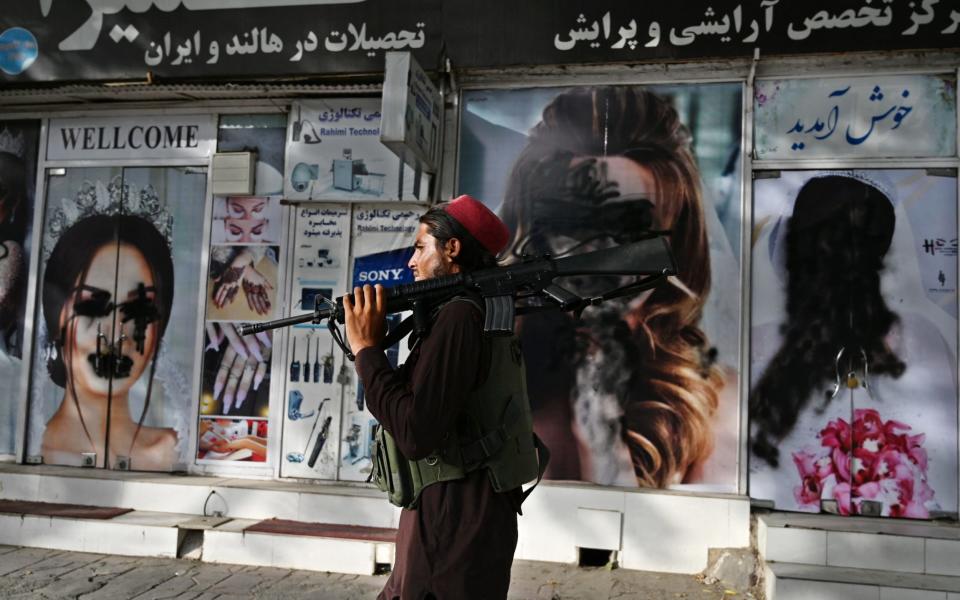Arezo’s honey shop wasn’t commerce. It was survival. Every golden jar sold meant food for her seven children.
Then the Taliban came.
She was in her shop this summer when a group of fighters-turned-officials, with American rifles slung over their shoulders, stormed in.
Her crime was selling honey to male customers as a female business owner, which is forbidden under the Taliban regime. She ended up in jail.
Since returning to power in August 2021, the Taliban has systematically curbed women’s rights in Afghanistan.
The restrictions affect their daily lives, ranging from preventing them showing their faces in public or driving a car, to forbidding conversations with men and restricting how they dress.

However, in recent months, there have been increasing signs of discord from within the ranks of the Taliban as it tries to transform itself from a guerrilla force to a functioning government.
Some senior figures – including Sher Mohammad Abbas Stanikzai, deputy foreign minister – have openly criticised the policies of the Taliban leadership towards women.
“Any leader, governor, minister, or commander who does not live among their people understands that they are isolated from the people, and their rule will not last long,” he said earlier this year.
Other discontent is more private. An official inside the Taliban’s morality ministry told The Telegraph most of the rules it was told to enforce were about “controlling women” and “often don’t even make sense”.
In the case of Azero’s honey shop, the Taliban told her she couldn’t sell anything to men.
“I asked how I could choose my customers,” she told The Telegraph from a city near the capital Kabul.

“They said I should send my husband or my sons to the shop and I said I cannot do it as they help gather the honey,” she recalls.
Her husband became disabled four years ago after his car was destroyed by a roadside bomb planted by the Taliban, which makes it difficult for him to travel. Her three sons are too young to assist with such responsibilities.
The Taliban officials later tried to take control of Azero’s shop after they accused her of “promoting prostitution”.
But when she argued back, she was slapped and punched before being arrested and spending two weeks in jail.
Arezo now sells her products online through Telegram and Instagram, but her income has significantly fallen – online shopping is uncommon in Afghanistan, where most do not have internet access.
“It has made life very difficult for us,” she said. “They told me that, to reopen my shop, I need to have a male guardian with me throughout the day.”
Women who defy the Taliban’s draconian rules are routinely arrested and sent to prison.

Mullah Haibatullah Akhundzada, the Taliban’s supreme leader, has also vowed to publicly stone women to death for adultery.
Some women, who need to travel outside their provinces but do not have a male guardian to accompany them, disguise themselves in men’s clothing to bypass Taliban checkpoints, The Telegraph understands.
According to a bus driver, Taliban officers violently arrested a woman last week after discovering she was travelling from Badghis to Herat province on a bus while dressed in men’s clothing.
“Explaining how these days are passing is difficult,” a university graduate tells The Telegraph from Kabul. “It feels like life has dropped us off in the middle of a vast and endless desert.”
“We need to escape this monotony, but when I look for entertainment, what do I find? Nothing,” she explains.
During its 20-year insurgency, the Taliban stayed mostly unified despite leadership crises, competition from Islamic State and a deadly war against US, Afghan and other forces.

When Mr Stanikzai criticised the Taliban’s policies, he did not name anyone specifically, but he was apparently referring to Mullah Akhundzada, who has the final say in the Taliban government and has never been seen in public.
Mullah Akhundzada acknowledged the splits within the ranks during his Eid speech earlier this year and urged unity among officials. He also called on them to refrain from publicly criticising one another.
An official in the Taliban’s defence ministry spoke of the growing dissatisfaction within the Taliban government.
“Most of the people are angry because of the rules imposed by the supreme leader, and this anger has reached some officials as well,” the official told The Telegraph from Kabul.

“He [Mullah Akhundzada] has created an atmosphere of fear and connected it to the religion where no one even dares to speak up, “ the official said.
“If someone speaks up, they will not be regarded as someone who criticises the regime, but it would be seen as an insult to the religion,” he explained.
The official added that “many officials, wherever they are, feel excluded from the government, and it is not good”.
Afghan women, however, say the political divisions have no impact on their lives as restrictions are imposed on them on a daily basis.
“We didn’t have much, but we were building something for ourselves,” said the university graduate in Kabul, referring to the years prior to the Taliban’s return. “Now we are so defenceless and there’s no one to defend us.”
EMEA Tribune is not involved in this news article, it is taken from our partners and or from the News Agencies. Copyright and Credit go to the News Agencies, email news@emeatribune.com Follow our WhatsApp verified Channel




